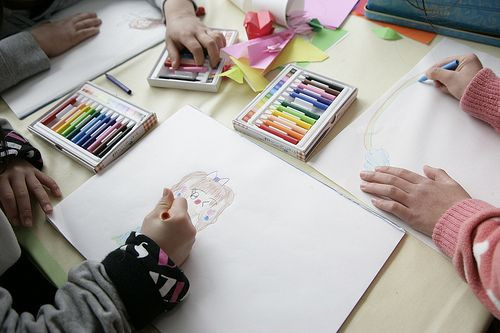Art Therapy And Dementia: How Creativity Helps Unlock Alzheimer’s Patients’ Thoughts And Fears

Out of the many precious faculties that dementia robs from a person, artistic ability does not seem to be one of them, a recent study finds. And as the elderly slip into old age, creative expression could be the key that unlocks what mental illness keeps so painfully inaccessible.
Opening The Mind With Art
Communication is one of the early losses in a person’s battle with dementia. While an individual may think the same thoughts or carry the same fears, the ability to transmit those thoughts and feelings diminishes as the disease worsens. A study from St. Michael’s Hospital in Toronto shows promising results for dementia patients whose artistic ability has allowed them to communicate with loved ones and hospital wait staff.
Published in the Canadian Journal of Neurological Sciences, the study focused on internationally renowned sculptor Mary Hecht before her death in April 2013. Hecht’s artistic abilities were undoubted before her battle with dementia, but what doctors found fascinating was her propensity to draw detailed sketches and portraits, all from memory, in the years leading up to her death. This was all in spite of a severe case of vascular dementia, a form of mental illness similar to Alzheimer’s that is marked by severe decline in thinking skills due to reduced blood flow to the brain.
"Art opens the mind," study author Dr. Luis Fornazzari, neurological consultant at St. Michael's Hospital's Memory Clinic, said in a statement. "Mary Hecht was a remarkable example of how artistic abilities are preserved in spite of the degeneration of the brain and a loss in the more mundane, day-to-day memory functions."
Due to her previous strokes, Hecht was bound to a wheelchair. Her cognitive ability was so impaired that she couldn’t reproduce the correct time in a simple drawing of a clock; she also couldn't remember any of the words she was asked to recall or name common animals. Yet she was able to reproduce from memory a drawing she had done free-handedly moments earlier. She also drew a detailed portrait of a research assistant at the hospital’s Memory Clinic.
"This is the most exceptional example of the degree of preservation of artistic skills we've seen in our clinic," said Dr. Corinne Fischer, director at the Memory Clinic and another of the paper's authors. "As well, most of the other studies that have been done in this area looked at other kinds of dementia such as Alzheimer's disease or frontal temporal dementia, while this is a case of cognitive reserve in a patient with fairly advanced vascular dementia."
Communicating What Words Can't
Cases similar to Hecht’s abound in hospitals practicing art therapy. And while the practice has verified palliative benefits, doctors remain unsure why creative expression has such profound effects.
“Art therapy is helpful for dementia and Alzheimer’s patients,” said Dr. Daniel Potts, neurologist and dementia specialist in Alabama, “because it enables an individual who is having trouble communicating to bypass the language problems they may be having and communicate and express themselves in a different way.”
Scientists don’t know what causes Alzheimer’s disease, which is the most common form of dementia and results from amyloid protein deposits in the brain’s nerve cells. These plaques spread through the cortexes as the diseases progresses, slowing mental function and inhibiting critical neurological processes associated with memory and cognition. Art therapy seems to “reroute” communication pathways away from traditional means.
“There seems to be something about the production of art that can bypass some of the other problems of dementia,” Potts said. “Art and music seem to draw from many different regions of the brain.”
While these forms of therapy cannot cure a person’s dementia, they can offer substantial rewards that a person may not otherwise receive in such an impaired state. These come from personal accomplishments, the satisfaction of completion, and simply the joy of the artistic process.
“It gives an individual a sense of accomplishment,” added Potts. “They’re losing their cognition, but art therapy gives them a way to create and get some satisfaction. It allows their true self to be expressed when it otherwise can’t.”
Source: Fornazzari L, Ringer T, Ringer L, Fischer C. Preserved Drawing in a Sculptor with Dementia. Canadian Journal of Neurological Sciences. 2013.
Published by Medicaldaily.com



























